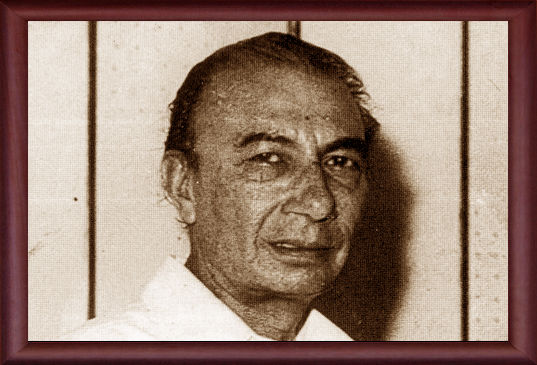He does not mince words, does not sublimate emotions, expresses thoughts clearly and directly. He gets angry and sarcastic, and at the same time he dreams. It is the dreamer in Sahir that gives him his characteristic style.
Born as Abdul Hayi on March 8, 1921 at Ludhiana, Punjab. Sahir was the only son of a Ludhiana zamindar.
He completed his graduation from Government college, Ludhiana. His parents' estrangement and the Partition made him shuttle between India and Pakistan. It also brought him face to face with a struggle called life. A member of the Progressive Writers' Association, he edited Adab-e-Latif, Pritlari, Savera and Shahrab. An arrest warrant issued by the Pakistani government of the day made him flee to Bombay in 1949. By now, he had managed to publish his anthology Talkhiyaan (Bitternesses). Besides Talkhiyaan and the hundreds of film songs he penned in a career spanning three decades, Sahir also authored the anthologies Parchaiyaan, Aao Ki Koi Khwab Buney and Gaata Jaaye Banjara.
Whether it was the arrest of progressive writers in Pakistan, the launch of the satellite Sputnik, or the discovery of Ghalib by a government lusting minority votes, Sahir reacted with a verve not seen in many writers' work. Kahat-e-Bangal (The Famine of Bengal), written by a 25-year-old Sahir, bespeaks maturity that came early. His Subah-e-Navroz (Dawn of a New Day), mocks the concept of celebration when the poor exist in squalor.
Sahir debuted in films with his lyrics for Aazadi Ki Raah Par (1948), the film had four song written by him. His first song was 'Badal Rahi Hai Zindagi..' for Aazadi Ki Raah Par. The film went un-noticed and so its songs. But, with 1951's Naujawan, he got the recognition.
S. D. Burman composed the music for Naujawan. Even today, the film's lilting song 'Thandi Hawayen Lehrake Aaye..' makes hearts flutter. His first major success came the same year with Guru Dutt's directorial debut, Baazi, again pairing him with composer
S. D. Burman. After the success of Naujawan and Baazi, the combination of Sahir and
S. D. Burman, came out with many more everlasting songs: 'Yeh Raat Yeh Chandni Phir Kahaan..' from Jaal (1952), 'Jaaye to Jaaye Kahaan..' from Taxi Driver (1954), 'Teri Duniya Mein Jeene Se..' from House Number 44 (1955), and 'Jeevan Ke Safar Mein Rahi..' from Munimji (1955). The duo reached their creative zenith with Pyaasa (1957). But, after Pyaasa, Sahir and Sachinda parted their ways due to some misunderstandings.
Later Sahir worked mostly with
N. Dutta, who was a great fan of Sahir. They already had worked for Milaap in 1955. Sahir wrote many unforgettable gems for Datta. They worked together for Marine Drive (1955), Light House (1958), Bhai Bahen (1959), Saadhna (1958), Dhool Ka Phool (1959), Dharamputra (1961), Dilli Ka Dada (1962) and many other films. Together they produced many unforgettable melodies: 'Tang Aa Chuke Hain Is Kashmakashe Zindagi Se..' from Light House, 'Mere Nadeem Mere Humsafar Udaas Na Ho..' from Bhai Bahen, 'Aurat Ne Janm Diya Mardon Ko..' from Saadhna, 'Tu Hindu Banega Na Musalman Banega..' from Dhool Ka Phool and 'Ye Kiska Lahu Hai..' from Dharmputra, to name a few.
Sahir's work in the 1970s was mainly restricted to films directed by Yash Chopra. Though his output in terms of number of films had thinned out, the quality of his writings commanded immense respect. Kabhi Kabhie (1976) saw him return to sparkling form. These songs won him his second Filmfare award, the first one being for Taj Mahal. Sahir's poetry had a Faizian quality. Like Faiz Ahmed Faiz, Sahir too gave Hindustani/Urdu poetry an intellectual element that caught the imagination of the youth of the forties and fifties and sixties. He helped them to discover their spine. Sahir asked questions, was not afraid of calling a spade a bloody spade, and roused people from an independence-induced smugness. He would pick on the self-appointed custodian of religion, the self-serving politician, the exploitative capitalist, the war-mongering big powers. Aren't they familiar? Close to Sahir's heart were the farmer crushed by debt, the young man sent to the border to fight somebody's dirty war, the lass forced to sell her body, the youth frustrated by unemployment, families living in dire poverty... The underdog remains; his bard is gone.
A bachelor to the end, Sahir fell in love with writer Amrita Pritam and singer Sudha Malhotra, relationships that never fructified in the conventional sense and left him sad. A young Amrita Pritam, madly in love with Sahir, wrote his name hundreds of times on a sheet of paper while addressing a press conference. They would meet without exchanging a word, Sahir would puff away; after Sahir's departure, Amrita would smoke the cigarette butts left behind by him. After his death, Amrita said she hoped the air mixed with the smoke of the butts would travel to the other world and meet Sahir! Such was their obsession and intensity.
A colossus among song writers, Sahir fought for, and became the first film lyricist to get, royalty from music companies. He would deeply involve himself in the setting of tunes for his songs. Any wonder why they are extra melodious? Sahir died after a heart attack he suffered while playing cards, on October 25, 1982. Over two decades after his death, Sahir's songs remain immensely popular.

